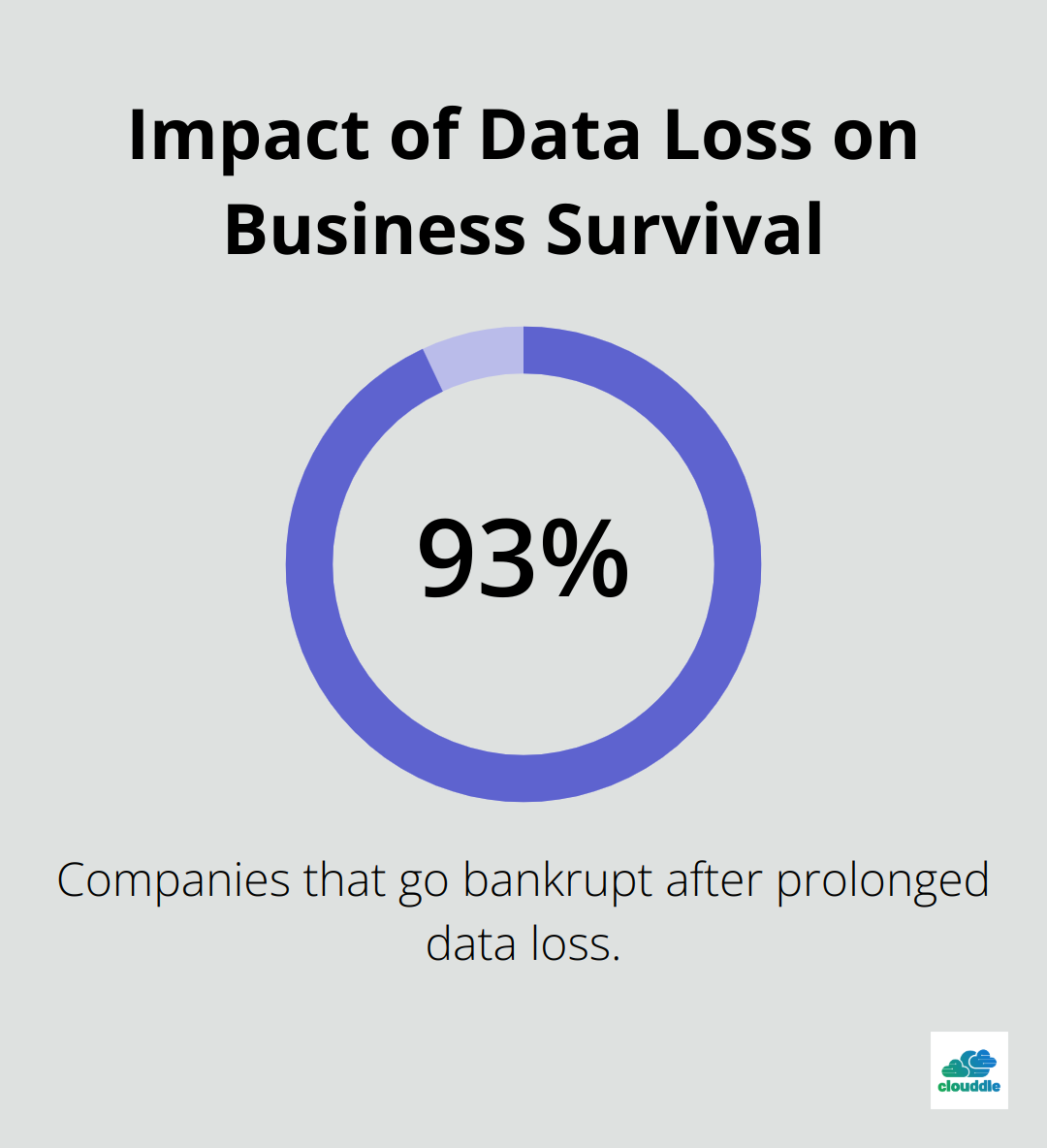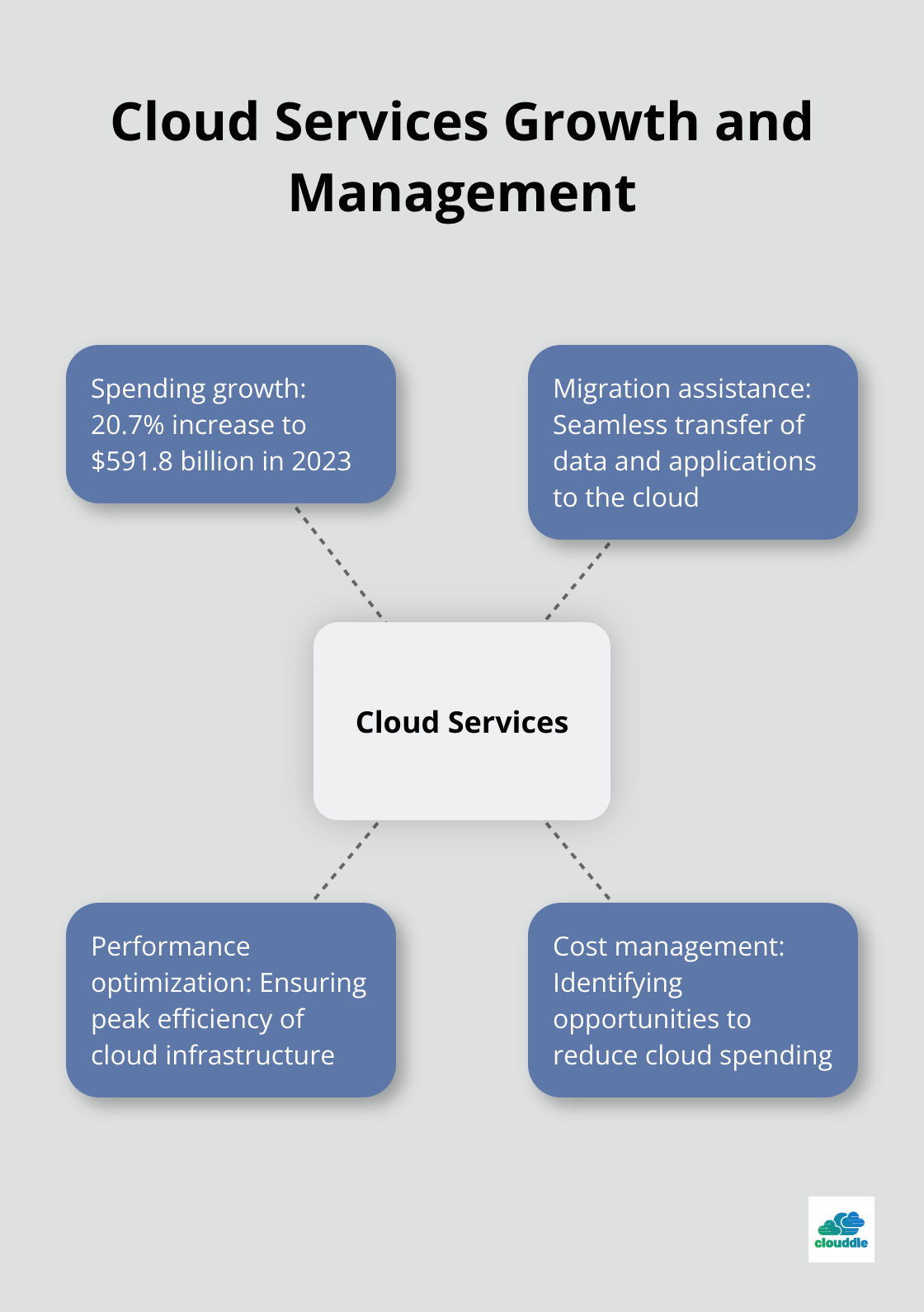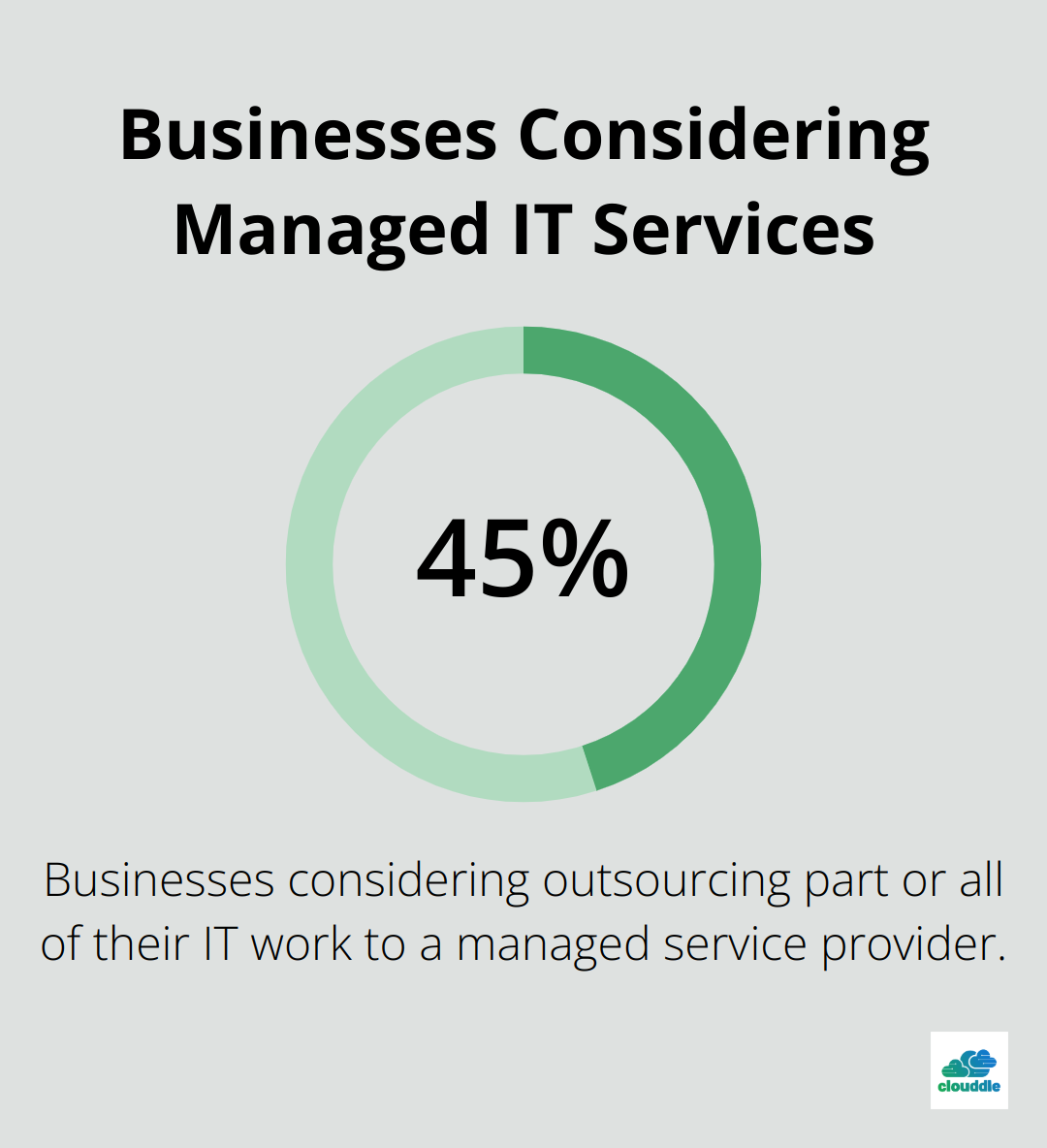Managed IT services have become essential for businesses of all sizes. At Clouddle, we often get asked: “What is included in managed IT services?”
The answer varies, but typically encompasses a range of core components and advanced offerings designed to keep your technology running smoothly. From network monitoring to cloud management, these services can be tailored to meet your specific business needs.
What’s at the Core of Managed IT Services?
At the heart of managed IT services lie essential components that form the foundation of a company’s technological infrastructure. These core elements ensure smooth operations and minimize downtime, transforming businesses in the process.
Round-the-Clock Network Monitoring
Network monitoring acts as a vigilant guardian that never sleeps. It identifies issues before they escalate into problems. A study by the Ponemon Institute revealed that IT downtime costs an average of $5,600 per minute. Effective network monitoring tracks crucial metrics like latency, throughput, and errors, and uses protocols such as SNMP and NetFlow to collect data.
Ironclad Security Measures
In today’s digital landscape, cybersecurity isn’t just important-it’s a necessity. IBM’s Cost of a Data Breach Report states that the average cost of a data breach in 2021 was $4.24 million. Multi-layered security protocols (including firewalls, intrusion detection systems, and regular vulnerability assessments) form the backbone of robust IT security. Employee training is also vital, as human error accounts for 95% of cybersecurity breaches (according to IBM).
Bulletproof Data Backup and Recovery
Data loss can spell disaster for businesses. 93% of companies that experience prolonged data loss go bankrupt. Effective backup solutions create multiple, encrypted copies of data, stored both on-site and in secure off-site locations. Regular recovery drills ensure quick data restoration in case of emergencies.

Responsive Technical Support
Technical issues can arise at any moment, requiring swift resolution. A well-staffed help desk with certified IT professionals can handle a wide range of issues. Top-tier managed IT service providers try to achieve first-call resolution rates above 80% (considered best-in-class according to HDI’s industry benchmarks). This approach results in fewer escalations and faster problem-solving for teams.
These core components work in tandem to create a robust IT infrastructure that supports business goals. They free up internal resources, allowing companies to focus on strategic initiatives that drive growth and innovation.
As we move beyond these foundational elements, it’s important to explore the advanced offerings that take managed IT services to new heights. Let’s examine how cloud services, strategic consulting, and other sophisticated solutions can further enhance your IT ecosystem.
Beyond the Basics: Advanced IT Management
Cloud Services: The New Frontier
Cloud computing has revolutionized business operations. Worldwide end-user spending on public cloud services is forecast to grow 20.7% to total $591.8 billion in 2023, up from $490.3 billion in 2022. This surge underscores the importance of expert cloud management.

Top-tier managed IT providers offer comprehensive cloud services, including:
- Migration assistance: They transfer your data and applications to the cloud seamlessly.
- Performance optimization: They ensure your cloud infrastructure runs at peak efficiency.
- Cost management: They identify opportunities to reduce cloud spending (which can often spiral out of control without proper oversight).
Strategic IT Consulting: Aligning Technology with Business Goals
IT strategy should support and drive business objectives. Advanced managed IT services include strategic consulting to help businesses:
- Identify technology gaps that may hinder growth.
- Plan for future IT needs based on business projections.
- Implement emerging technologies that can provide a competitive edge.
Deloitte’s 2016–2017 Global CIO Survey reveals that 35 percent of CIOs surveyed report to CEOs, 20 percent to CFOs, and the remainder to myriad other executives. This highlights the growing importance of strategic IT consulting.
Navigating the Compliance Maze
In an era of increasing regulation, compliance has become a critical concern for businesses across industries. Advanced managed IT services help organizations navigate this complex landscape by:
- Conducting regular compliance audits.
- Implementing necessary security measures to meet regulatory requirements.
- Providing documentation and reporting for compliance purposes.
For instance, in the healthcare sector, HIPAA compliance is non-negotiable. Managed IT services can significantly reduce this risk.
Proactive Hardware and Software Management
Advanced managed IT services take a proactive approach to hardware and software management:
- They perform regular system health checks to identify potential issues before they cause downtime.
- They automate software updates and patch management to ensure security and optimal performance.
- They manage asset lifecycles, including timely hardware replacements to prevent productivity loss due to aging equipment.
These advanced managed IT services empower businesses to stay ahead of the technology curve and ensure compliance while focusing on their core competencies. As technology continues to evolve, the question arises: how can businesses tailor these services to their specific needs? Let’s explore the customization and scalability options available in managed IT services.
How Managed IT Services Adapt to Your Business
Tailoring Services to Specific Needs
At Clouddle, we recognize that each business has unique IT requirements. A CompTIA study revealed that 46% of businesses consider customization a key factor when selecting a managed service provider. We conduct a comprehensive assessment of your current IT infrastructure, business objectives, and challenges. This approach allows us to create a custom package that addresses your specific needs.
For example, a healthcare provider might require robust HIPAA-compliant data protection, while a retail business might prioritize point-of-sale system management. Our tailored services ensure you don’t pay for unnecessary features while receiving the support you need most.
Flexible Service Level Agreements
Service Level Agreements (SLAs) form the foundation of managed IT services. They outline the scope, quality, and responsibilities of the service provider. 45% of businesses are considering outsourcing part or all of their IT work to a managed service provider.
We offer adaptable SLAs that adjust to your changing needs. This flexibility might include different response times for critical vs. non-critical issues, varying levels of on-site support, or adjustable data backup frequencies. The goal is to create an agreement that aligns with your business operations and budget.

Scalable Solutions for Business Growth
As your business expands, your IT needs will evolve. Scalable managed IT services ensure that your technology keeps pace with your growth. This scalability might involve adding new users to your network, expanding your cloud storage capacity, or implementing more advanced cybersecurity measures.
A Spiceworks survey found that 44% of businesses plan to increase their IT budgets in the coming year (with much of that increase allocated to managed services). Choosing a provider that offers scalable solutions helps you avoid the hassle of switching providers or dealing with service gaps as your business grows.
Industry-Specific IT Management
Different industries have distinct IT requirements. We offer specialized IT management solutions tailored to specific sectors. For instance:
- Healthcare: We provide HIPAA-compliant data protection and electronic health record (EHR) system management.
- Finance: Our services include robust cybersecurity measures and compliance with financial regulations (e.g., PCI DSS).
- Manufacturing: We offer solutions for inventory management systems and industrial IoT device integration.
This industry-specific approach ensures that your IT infrastructure aligns perfectly with your sector’s unique challenges and opportunities.
Final Thoughts
Managed IT services include a wide range of offerings to keep businesses running smoothly in today’s digital landscape. From network monitoring and security to cloud management and strategic consulting, these services form the backbone of modern IT infrastructure. The answer to “What is included in managed IT services?” varies based on each organization’s unique needs and can be tailored accordingly.
Comprehensive IT management reduces downtime, enhances security, ensures data protection, and provides responsive technical support. It allows companies to focus on their core competencies while experts handle complex IT tasks. The scalability and customization options enable businesses to adapt their IT services as they grow and evolve.
Choosing the right managed IT provider maximizes these benefits. Clouddle offers cutting-edge technology solutions for industries like hospitality, multi-family dwelling, and senior living. Our managed IT services, networking solutions, and security services streamline operations and increase revenue without requiring initial investment. We empower businesses to thrive in an increasingly connected world with 24/7 customer support and flexible contracts.


